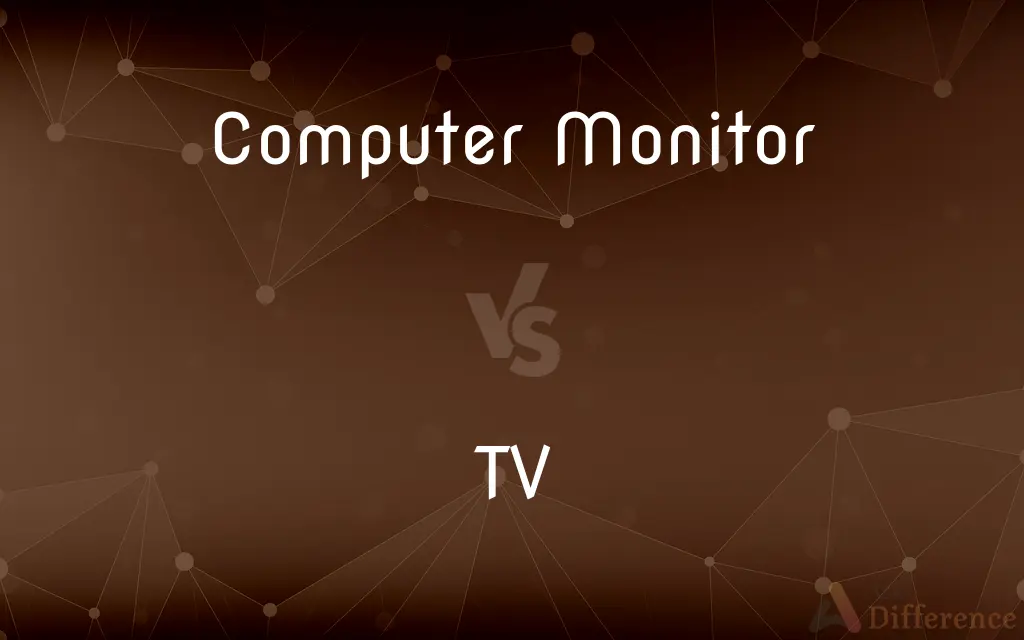Computer Monitor vs. TV — What's the Difference?
Edited by Tayyaba Rehman — By Urooj Arif — Published on September 1, 2024
Computer monitors offer higher resolutions and refresh rates for detailed images and smooth visuals, while TVs prioritize size and integrated smart features.

Difference Between Computer Monitor and TV
Table of Contents
ADVERTISEMENT
Key Differences
Computer monitors are designed for close-up interaction, featuring higher resolutions and refresh rates to provide detailed images and smoother visuals, crucial for tasks like gaming, graphic design, and detailed work. They often come with features like adaptive sync technologies to reduce screen tearing. On the other hand, TVs are optimized for viewing from a distance, focusing on larger screen sizes and integrated smart features like streaming apps and voice control. They prioritize color accuracy and contrast for a cinematic experience but typically have lower refresh rates compared to monitors.
Monitors usually offer more connectivity options suited for computers, like DisplayPort and USB-C, enabling high data transfer rates and often providing the ability to serve as a USB hub. TVs, however, tend to include more HDMI ports, catering to a variety of devices such as gaming consoles, sound systems, and streaming devices. This difference highlights their respective roles in a user's ecosystem of devices.
When it comes to response time, monitors generally offer quicker response times than TVs, reducing motion blur and improving the experience for fast-paced activities such as gaming or dynamic video content. This is a key factor for users requiring precision and immediacy in their display's performance.
The price range of monitors and TVs can vary widely, but monitors can often be more affordable when comparing screens of similar sizes and features. However, TVs offer better value in terms of screen size, making them a more cost-effective choice for users looking for a larger display.
In terms of use case, monitors are favored for their performance in computing tasks, gaming, and professional applications requiring precision and detail. TVs are chosen for their ability to deliver a comprehensive entertainment experience, suitable for watching movies, television shows, and playing console games in a relaxed setting.
ADVERTISEMENT
Comparison Chart
Primary Use
Detailed work, gaming
Viewing from a distance, entertainment
Screen Size
Smaller, optimized for desk use
Larger, for room-wide viewing
Resolution and Refresh Rate
Higher resolution and refresh rate
Lower refresh rate, focus on color and contrast
Connectivity
DisplayPort, USB-C
More HDMI ports, smart features
Response Time
Lower (faster)
Higher (slower)
Price for Size
Higher for smaller screens
Lower for larger screens
Intended Use
Computing tasks, professional work
Movies, TV shows, casual gaming
Compare with Definitions
Computer Monitor
Offers ergonomic adjustments.
The monitor can be tilted and adjusted for optimal viewing comfort.
TV
Integrated smart features.
The TV comes with built-in streaming apps and voice control.
Computer Monitor
A display device for personal computers.
The graphic designer chose a 4K monitor for precise image editing.
TV
Prioritizes color accuracy and contrast.
This TV model is known for its vibrant colors and deep blacks.
Computer Monitor
Known for high refresh rates.
Gamers prefer monitors with at least a 144Hz refresh rate for smooth visuals.
TV
Designed for a variety of devices.
The TV has multiple HDMI ports to connect a console and soundbar.
Computer Monitor
Suited for detailed tasks.
The 4K monitor is excellent for video editing, offering crisp details.
TV
Better for casual gaming and movies.
They bought a TV with a game mode to reduce input lag while gaming.
Computer Monitor
Features adaptive sync technology.
His monitor supports G-Sync to minimize screen tearing.
TV
A large screen for viewing multimedia content.
Their living room features a 65-inch TV for family movie nights.
TV
Television
What's on TV?.
TV
A television
She bought a new TV.
TV
Alternative form of TV
TV
Broadcasting visual images of stationary or moving objects;
She is a star of screen and video
Television is a medium because it is neither rare nor well done
TV
A receiver that displays television images;
The British call a tv set a telly
Common Curiosities
Why do monitors have higher refresh rates than TVs?
Higher refresh rates in monitors support smoother visuals and responsiveness, crucial for gaming and precision tasks.
Are TVs or monitors more expensive?
Price varies by size and features, but TVs generally offer better value for larger screen sizes.
Can I use a TV as a computer monitor?
Yes, but you may notice lower refresh rates and higher response times compared to using a traditional computer monitor.
Can a computer monitor be used for gaming?
Yes, monitors are often preferred for gaming due to their higher refresh rates and lower response times.
Can I use a monitor for watching movies?
Yes, though TVs might provide a more cinematic experience with larger screens and integrated audio.
Are there monitors that come with smart features like a TV?
While some monitors incorporate features like built-in streaming or internet connectivity, they're less common than in TVs.
How does viewing distance affect the choice between a monitor and a TV?
Monitors are designed for close viewing, while TVs are made to be viewed from farther away, affecting size and resolution choices.
Do TVs have better color accuracy than monitors?
TVs are often calibrated for vibrant color and contrast, making them ideal for movies and TV shows.
What's the main difference between a computer monitor and a TV?
Monitors are optimized for computing tasks and detailed work, while TVs focus on size and multimedia entertainment.
Why do monitors offer more connectivity options for computers?
Monitors are designed to connect seamlessly with computers and peripherals, offering ports like DisplayPort and USB-C.
What is response time, and why does it matter?
Response time measures how quickly a display can change pixels from black to white or from one shade of gray to another, affecting motion blur.
What does "adaptive sync technology" mean?
It refers to a technology that synchronizes the display's refresh rate with the graphics card's output to reduce tearing and stuttering.
Why do some gamers prefer TVs over monitors?
Some gamers may prefer TVs for console gaming due to the larger screen size, though they may sacrifice some responsiveness.
How do ergonomic features differ between monitors and TVs?
Monitors often offer ergonomic adjustments like tilt, swivel, and height, tailored for comfortable desk use, which TVs typically lack.
What should I consider when choosing between a monitor and a TV for a home office?
Consider the type of work, desk space, and whether you'll use the display for tasks requiring high detail and precision.
Share Your Discovery

Previous Comparison
Bean vs. Legume
Next Comparison
Grind vs. PowderAuthor Spotlight
Written by
Urooj ArifUrooj is a skilled content writer at Ask Difference, known for her exceptional ability to simplify complex topics into engaging and informative content. With a passion for research and a flair for clear, concise writing, she consistently delivers articles that resonate with our diverse audience.
Edited by
Tayyaba RehmanTayyaba Rehman is a distinguished writer, currently serving as a primary contributor to askdifference.com. As a researcher in semantics and etymology, Tayyaba's passion for the complexity of languages and their distinctions has found a perfect home on the platform. Tayyaba delves into the intricacies of language, distinguishing between commonly confused words and phrases, thereby providing clarity for readers worldwide.













































